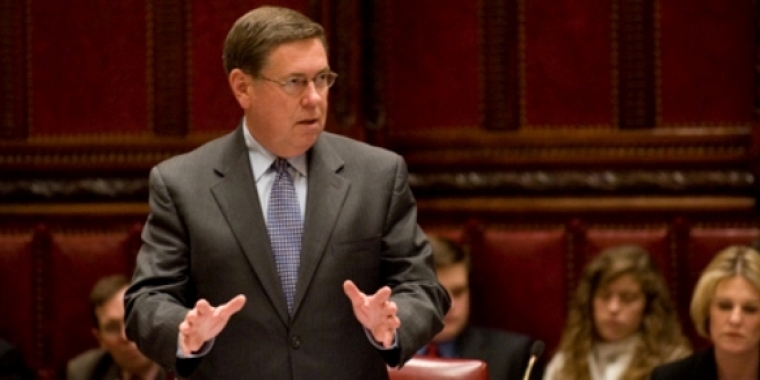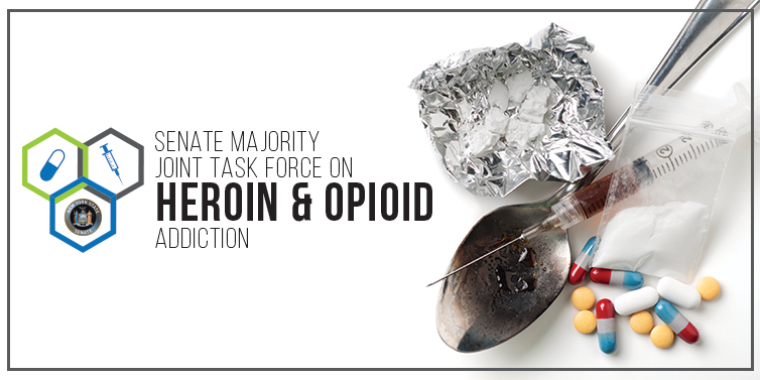
Senate Republicans Unveil "A Better Plan for New York"

ALBANY, 03/05/09 – Senator James L. Seward (R/C/I-Oneonta) and New York state senate Republicans today offered a comprehensive budget savings plan that spends less than the governor’s budget, rejects $6.2 billion in taxes and fees proposed by Governor Paterson, implements a spending cap to restrain future spending growth and helps businesses create jobs to strengthen the state’s economy.
The plan leaves $1.2 billion currently in reserves untapped and fully funded, and increases the state’s overall fiscal reserves by nearly $1 billion so New York is on sounder fiscal footing.
It makes needed investments in education, jobs, and health care and restores the $1.7 billion STAR rebate program for middle class families that was omitted from the Governor’s Executive Budget.
It provides for reductions in government spending and other cost cutting measures of $5.5 billion to help restore balance to the state’s finances.
“We need real reform if we are to move forward in New York,” said Senator James L. Seward. “This senate Republican budget savings plan means families will have more of their own money to spend, upstate businesses will have greater opportunities, and we will be able to start growing our way out of this current financial downturn.”
“The senate Republican budget savings plan is a blueprint for helping middle-class families and small businesses, and ensuring that New York’s future is even better than its past,” Senate Republican Leader Dean G. Skelos said. “Our plan makes real and recurring spending reductions, and provides tax relief to New Yorkers who are already paying the highest taxes in the nation and dealing with the worst financial crisis since the Great Depression.”
The plan includes an additional spending cut of $1.2 billion above the governor’s budget and cuts the rate of growth to 1.6 percent. Among other things, it consolidates a number of redundant or underutilized state agencies ($266 million), reduces non-personnel agency spending by 5 percent ($138 million), freezes state purchases of recreational lands ($78 million), cuts 1 percent from agency contracts ($519 million), enforces a state law to collect $500 million in cigarette taxes on Indian reservations and captures $175 million more in Medicaid fraud recoveries to build on the senate Republicans success in creating the state’s Office of Medicaid Inspector General.
Senator Seward says the federal stimulus aid headed to New York should allow the state to reject the $6 billion dollars in job-killing taxes and fees proposed by the governor. He says schools and hospitals should be made whole again, and real reform measures need to be enacted to make sure we are not in this same situation when the federal dollars are gone.
Along with elimination of the STAR rebate checks, the governor’s budget also raises 142 different taxes, including taxes on gasoline, music and video downloads, gym memberships, movie and concert tickets, plane and train tickets, haircuts, fishing licenses, beer, wine, and non-diet soft drinks. A senate Republican analysis shows that the average New York family would pay $3320 in additional taxes under the governor’s plan.
On top of that, senate and assembly Democrats have called for a massive personal income tax increase that would force New Yorkers to pay the highest income tax rates in the country.
“Governor Paterson and his Democrat colleagues in the legislature are intent on raising taxes,” said Seward. “No one has ever taxed his way out of an economic downturn, we need to make fundamental budget cuts, and emphasize job creation, especially upstate.”
Seward added that instead of raising taxes, the stimulus monies should be used to roll back the “covered lives” tax increase the governor and the Democrats approved that will raise health insurance premiums for businesses and individuals, and lead to higher premiums for all New Yorkers.
In addition, the state should allow the recently approved SUNY tuition increase to be utilized by SUNY campuses, rather than seize it to pay for higher state spending, as Democrats voted to do as part of their so-called “deficit reduction plan.” The harmful actions taken in the DRP which target middle-class families, small businesses and college students were unnecessary and shortsighted, Republicans noted.
While the governor’s budget failed to include any initiatives to create new jobs, it also abolishes the Empire Zone program - - eliminating benefits to more than 2,000 businesses - - without putting anything new in its place. In fact, the DRP even took $500 million that could have been tapped by the Power for Jobs program, a successful program that provides low cost power to businesses so they can create jobs.
The senate Republican plan would prevent businesses that receive Empire Zone benefits from executing layoffs ($272 million), provide low cost power for struggling businesses ($150 million), eliminate business taxes for distressed manufacturers ($40 million), offer a job creation tax credit ($90 million), and cut the current tax rate for small businesses by 50 percent. These actions represent the first stage of implementing the senate Republican jobs plan announced last fall.
Under the legislation enacted by Congress and signed into law by the President, New York must use the federal stimulus funds to restore the $1.23 billion in K-12 education cuts proposed by the governor. As required by law, those dollars must be restored to the schools that were cut by the governor and not be used as an attempt to treat any school or any region of the state unfairly. senate Republicans have called on the governor to resubmit the state education aid portion of his budget to ensure those cuts are restored.
In addition, the plan eliminates the governor’s taxes on hospitals, nursing homes and home health care and provides funding directly to hospitals and other health facilities to improve health care and cut state Medicaid spending.
Meanwhile, the senate Republicans called for passage of a constitutional spending cap that would limit year-to-year spending increases to no more than 4 percent to prevent future deficits and shore up the state’s long-term finances.
“We need to move forward with the budget process so we can meet the April 1st deadline. The Democrats and Governor Paterson have fallen far behind, failing to appoint budget conference committees and to openly and publicly negotiate the budget. It is my hope this senate Republican plan will get the ball rolling on needed property tax cuts, and sensible use of federal stimulus money so we can complete the budget process on-time,” concluded Seward.



